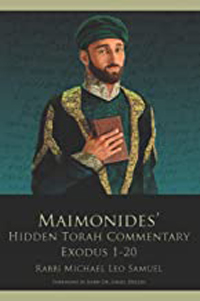
 BOCA RATON, Florida — The Spaniard Maimonides (1138-1204) is generally considered the greatest Jewish philosopher. He soars so high above other people that he is called “The Great Eagle.” The popular saying about him is “From Moses to Moses, there were none like Moses.” The first Moses is the biblical law giver. The second refers to Maimonides whose first name was Moses. The saying is stating the Maimonides surpassed in wisdom all of the prophets and all of the ancient sages.
BOCA RATON, Florida — The Spaniard Maimonides (1138-1204) is generally considered the greatest Jewish philosopher. He soars so high above other people that he is called “The Great Eagle.” The popular saying about him is “From Moses to Moses, there were none like Moses.” The first Moses is the biblical law giver. The second refers to Maimonides whose first name was Moses. The saying is stating the Maimonides surpassed in wisdom all of the prophets and all of the ancient sages.
He was not only a philosopher but also a doctor. Beside his writings on philosophy, he wrote about a dozen books on medicine, an extensive commentary on the Talmud, and a fourteen-volume series on Jewish Law.
Rabbi Michael Leo Samuel’s books on Maimonides’ interpretations of the biblical book Exodus, Maimonides Hidden Torah Commentary: Exodus 1-20, reveals much that many people do not know and does so in a clear and easy to read fashion. While 448 pages long, and filled with information, it is only the first of his two books on Exodus. It is superb. His two books on Genesis have already been published.
He includes insights that Maimonides had about the Exodus from Egypt and many concepts implicit in the biblical book but not stated explicitly. He tells readers the views and teachings of many other scholars, Jewish and non-Jewish. After reading his book, readers will learn much about religion in general, Judaism in particular, philosophy, mysticism, what is important in life, proper behavior, and will be prompted to think and understand new ideas, as well as develop fresh innovative sensible new views on ideas they held dear in the past.
He discusses how the Israelites changed in Egypt, that the idea of God remembering and hearing are metaphors, a close analysis of Moses’ first experience with God, what really are miracles, Maimonides thoughts on subjects such as divine tribulations, what is “sin,” the biblical use of anthropomorphisms such as “the hand of God,” for Jews do not believe that God has a physical body, and even subjects such as the origin of the practice to eat three meals on the Sabbath, a brief history of the ancient Jewish calendar, and Maimonides’ letter to a monk who converted to Judaism.
But this is not all. Among a wealth of other topics, Rabbi Samuel discusses: Should one lie to save lives, what inspired Moses who was raised in the Egyptian palace in luxury to help the oppressed Israelites? Are God’s names what people should call God, or do they indicate how God acts? Does the Tetragrammaton, y-h-v-h, indicate that God exists forever? What is the meaning of the divine name El Shaddai? Why was Moses reluctant to be a prophet? Where there other prophets who were also reluctant to do God’s will? How did Moses’ prophetic ability differ from that of other prophets? Why didn’t Maimonides include the belief in miracles in his list of thirteen principles of Judaism? How could Moses leave his father-in-law Jethro to return to Egypt to save the Israelites when he had sworn to Jethro that he would never leave him? What is the meaning of the biblical description that God hardened Pharaoh’s heart? Did God cause Pharaoh to “sin”?
He also compares Maimonides to the other rational thinkers Ibn Ezra and Spinoza as well as the mystic Ramban and contrasts them with ancient views. He speaks about classical and modern opinions on the origins of religion, was monotheism the original religion as the Bible seems to say, what are the views of anthropologists, the strange practice of praying to parents and angels, he compares Maimonides and Islamic theology, and discusses Maimonides and religious naturalism.
These items are just some of what Rabbi Samuel includes in his treasure trove of thought-provoking, eye opening, and valuable discussions.
*
Rabbi Dr. Israel Drazin is a retired brigadier general in the U.S. Army chaplain’s corps and the author of more than 50 books. The author of Maimonides Hidden Torah Commentary: Exodus 1-20, Rabbi Dr. Michael Leo Samuel, is spiritual leader of Temple Beth Shalom in Chula Vista, California.